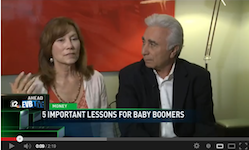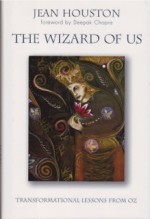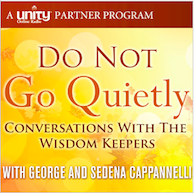Press Releases, Articles, and Reviews
Recent Additions:
For People Who Weren’t Born Yesterday
Straight talk, valuable life strategies, practical tools and inspiring messages for the 150 million Americans who will soon be 50 years old and older. These are just some of the things George and Sedena Cappannelli deliver in their eminently accessible “DO NOT GO QUIETLY: A guide to living consciously and aging wisely for people who weren’t born yesterday.”
Reviewed by Richard R. Blake for Reader Views (10/13)
In their book “Do Not Go Quietly: A Guide to Living Consciously and Aging Wisely for People Who Weren’t Born Yesterday,” the authors, George and Sedena Cappannelli describe a lifestyle revolution that “boggles the mind.” They then offer suggestions on how those of us in the second- half-of life-crowd can become engaged in influencing the course our world takes.
Articles:
It’s Never Too Late or Too Soon to Live Your Dreams, Bella Spark Magazine May/June 2013
It’s Never Too Late or Too Soon to Live Your Dreams, Radiance Magazine May/June 2013
It’s Never Too Late or Too Soon to Live Your Dreams, ThirdAge.com April 30, 2013
It’s Never Too Late or Too Soon to Live Your Dreams, The Life Connection June 2013
It’s Never Too Late or Too Soon to Live Your Dreams, Edge Magazine July 2013
It’s Never Too Late or Too Soon to Live Your Dreams, BellaSpark July 2013
Women and the Myth of Youth, Its All About Women.com June 4, 2013
10 Things Baby Boomers Can Do To Be Happier June 2013
The Extraordinary Gift of Being Curious June 2013
Make the Years After 50 The Best and Most Enriching of Your Life
Excerpts From Professional and Customer Reviews For Do Not Go Quietly
So much more than I expected April 30, 2013, 5.0 out of 5 stars
I didn’t expect to be so captivated by George and Sedena’s book. But, I found myself highlighting something significant to me on almost every page and lingering over the ideas presented. There are concepts and insights in Do Not Go Quietly that will keep me referring to its pages again and again.
For someone who “wasn’t born yesterday” this book is a perfect companion to my journey. I highly recommend it to anyone willing to take a closer look at what life can be as we age. You probably won’t accept every premise suggested by the authors, but there is enough between its covers to keep you fully engaged with their important message.
If not us, who? April 30, 2013, 4.0 out of 5 stars
If George and Sedena Cappannelli are an example of what social and spiritual awakening among the over-50 set can look like, there’s hope for this old world yet. Rather than seeing the years after 50 as a time of decline, they argue that these years can be embraced as a time of harvest of accumulated wisdom and an opportunity for redesigning and replanting one’s garden for the second half of life. The suggestions they give are not a one-size-fits-all, and I think were intended to be more indicative than prescriptive.
I suppose for those of us who missed out on the psychedelic scene, suggesting drugs today as a way to loosen up one’s spirituality can be a bit off-putting, but it is a small annoyance and doesn’t detract from the importance of their main message, which is calling on pre- and post-boomers to wake up to their power and responsibility to demand and embody change. Their book is part inspirational workbook, part sociopolitical education, and part revolutionary manifesto. Let’s hope for all our sakes, that it is also a harbinger of a real awakening to action by a demographic that has the time, resources and guts to lobby for change, and the wisdom to envision solutions that work for all.
GenXers–Take With A Grain of Salt (or a Shaker). Boomers and Elders–Enjoy!! April 24, 2013 4.0 out of 5 stars
Do Not Go Quietly (A Guide to Living Consciously and Aging Wisely for People Who Weren’t Born Yesterday), by George and Sedena Cappannelli, was given to me by Hay House in exchange for my honest opinion of it.
The introduction reveals that over the next decades half our population will be age 50 and older, for the first time in history. This book targets the demographic revolution that is occurring and how we affect in an unprecedented manner the political, social, economic, technological, environmental, and cultural influences.
Specific population groups included here are older GenXers (40 to 45), Boomers (46 to 64) and Elders (65 and beyond). These groups are celebrated for having the opportunity, time, talent, resources, and experience to mindfully facilitate this breakthrough that is happening. Well, hey–as I both fit into the target audience and am all for mindfully furthering a direction to a betterment of an outcome, I was all excited to read this book.
I have to say I liked the large number of quotes from a variety of very familiar and widely accepted icons in the field. The personal stories of specific people who are wonderful examples of what the authors are encouraging were very uplifting and interesting. I also appreciated what a great overall message the authors had to share of continuing to create a life of quality and accomplishment, especially as we all move into this next beautiful chapter of our lives. There is a lot of very good encouragement and support for who we are, where we’ve been, and where we can still go–on an individual as well as collective level.
There were a couple recurring areas of struggle that I had, and so I simply treated these as “to each their own.” I can get past the recommendation that one of the most valuable and powerful models of living is a commune. I suppose I can also choose to move forward from the repeated recommendation to embrace recreational hallucinogenic drugs in order to expand my spirituality.
Okay, I am fully aware that perhaps the authors and I are simply in separate demographic age groups. Or maybe we are in the same age group but have some areas of vast difference in how we experience and perceive life. All of that is well and good, and I’d like to focus on the parts of the book I appreciated more than the things that made me defensive. (Although the fact that the book had aspects that made me feel defensive is significant…you decide!) Here they are, in a nutshell:
Support for continued contribution, accomplishment, development, and personal growth. Great quotes from recognizable spiritual leaders. Uplifting life-story examples. Ultimately, we readers bring our own selves to the piece–if you are remotely interested in this book I would certainly recommend giving it your time and energy.
By Liz Sperling – Review Radio Talk Show Host
“The last time I had this feeling was when I put down Eckhart Tolle’s, The New Earth. I thought this man has nailed this subject in his genre. That’s exactly what I believe you have done with Do Not Go Quietly.”
By Frederic and Mary Ann Brussat
George and Sedona Cappanneli are co-founders of AgeNation, a digital media company dedicated to providing solutions for people who weren’t born yesterday. They are experts on societal, organizational, and individual change. They have targeted this inspirational book for GenXers (40-45), Boomers (46-64) and Elders (65+) who want to live richer and fuller lives. To achieve this goal they have put together a winning mix of straight talk, life strategies, and practical tools for the 150 million Americans who will soon be 50 years and older. In their dedication page, the authors pay special tribute to Zalman Schacter-Shalomi who has guided so many older people into a fresh understanding of spiritual eldering and conscious aging.
Although our culture still focuses on the pleasures and the potencies of youth, we are gradually seeing some baby steps being taken to herald the joys and satisfactions of later life. The Cappannellis offer encouragement for the road ahead with quotations, ideas, and resources on harvesting the wisdom of your past (dealing with incompletes, moving beyond limiting beliefs, dealing with little deaths), making the most of the present moment (going with the flow, being curious, staying awake, turning toward things that scare us, mastering the three great illusions, getting over being right), and charting a remarkable course for your future (crazy wisdom, let passion lead, and a legacy and stewardship of hope).
We affirm the Cappannellis’ enthusiasm and their confidence that the best is yet to come since elders will now have the time to devote to spiritual practices, inward journeys, and putting their lives in order through living wills and legacy work.
By Uma Girish
To most people in the West, “aging” is a word that conjures up dread and despair. Loss of beauty, youth and vitality are almost synonymous with invisibility. Even more reason to applaud the husband-wife team of George & Sedena Cappannelli who have co-authored Do Not Go Quietly: A Guide to Living Consciously and Aging Wisely for People Who Weren’t Born Yesterday.
This book not only celebrates the second half of life, it extols baby boomers as folks with rich life experiences who are custodians of a heritage. Divided into five sections, the book offers real-life stories of those who “harvested the wisdom” of their past and went on to shine light both for themselves and others who followed.The authors address relevant issues that a lot us struggle with such as the power of limiting beliefs, life purpose, befriending death, dealing with incompletions, forgiveness, living in the now, and much, much more.
This being a Grief blog, I will focus on some of what struck me as great advice and teaching from the chapter “Celebrating Life — Befriending Death.” My favorite part of this chapter is a quote from the wonderful Elisabeth Kubler-Ross: “It is the denial of death that is partially responsible for people living empty, purposeless lives; for when you live as if you’ll live forever, it becomes too easy to postpone the things you know that you must do.”
The chapter goes on to discuss how we fear death and therefore live in denial of what is an inevitable cycle of life. According to the authors, “We fear the loss of loved ones, of opportunities, and of what we think of as control over our lives. But the bottom line is that most of us fear the manner and consequences of our death far more than we fear the state or condition we call death.”
Another quote worth spending some time on is from Reverend Chariji, an Indian teacher. “Death is really a holiday from life. Babaji (his teacher) has used this beautiful analogy — that even the prisoners in the dungeons are let out for one or two hours every day to go up in the sunshine in the courtyards, to have fresh air, to have some exercise, so that they can face the next period of incarceration in the dungeon. Therefore, death is not a punishment. Neither is death an end. Some Occidental writers on the subject treat death with contempt, with fear. And many people have been educated into thinking that death is to be avoided, even by committing suicide, which is ridiculous. You cannot avoid death by dying. You can only avoid death by living properly.”
The best way to savor this book is by nibbling on tiny morsels of wisdom at a time. But every chapter is worth its weight in gold.
Originally Posted on umagirish.com










 A friend, Joel Harrison has written and recorded a song to support Do Not Go Quietly. Download it today at the link below and a portion of the royalies will support our efforts to make this an age friendly world.
A friend, Joel Harrison has written and recorded a song to support Do Not Go Quietly. Download it today at the link below and a portion of the royalies will support our efforts to make this an age friendly world.

Connect